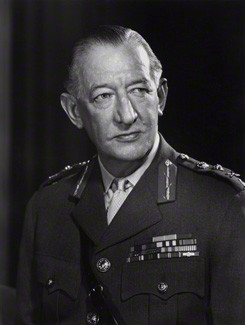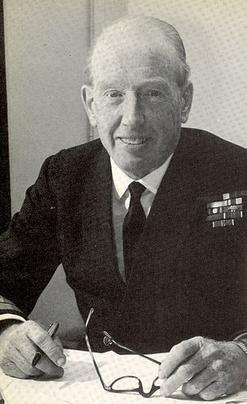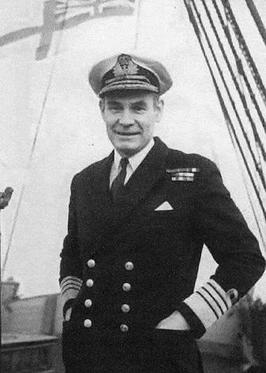Related Research Articles

Admiral of the Fleet Peter John Hill-Norton,Baron Hill-Norton,was a senior Royal Navy officer. He fought in the Second World War as gunnery officer in a cruiser operating on the Western Approaches and in the North Sea taking part in the Norwegian Campaign,then in a cruiser taking part in the Arctic convoys and finally in a battleship operating in the Eastern Fleet. After the War he commanded a destroyer and then an aircraft carrier. He served as First Sea Lord and Chief of the Naval Staff and then Chief of the Defence Staff in early 1970s. In the latter role he gave the final commitment to Project Chevaline,the Polaris missile improvement programme. He went on to be Chairman of the NATO Military Committee.

Field Marshal Sir Archibald James Halkett Cassels,was a senior British Army officer who served as Chief of the General Staff (CGS),the professional head of the British Army,from 1965 to 1968. As a young man he was a first-class cricket player,initially playing in India for the Europeans against the Hindus in the Lahore Tournament and going on to play for a Punjab Governor's XI against Northern India team and for a Viceroy's XI against the Roshanara Club. He later played for the British Army cricket team against the RAF at The Oval and then played for the Egyptian national side against HM Martineau's XI in Alexandria.
General Sir Roger Neil Wheeler,is a retired British Army officer who served as Chief of the General Staff from 1997 to 2000. During his career he was involved in the Cyprus Emergency,directed military operations in Northern Ireland and led the UK's forces deployed on NATO operations in Bosnia. He is now a non-executive director of several businesses operating on an international basis.

Admiral of the Fleet Sir Michael Le Fanu was a Royal Navy officer. He fought in the Second World War as gunnery officer in a cruiser operating in the Home Fleet during the Norwegian campaign and the Battle of the Mediterranean and then as gunnery officer in a battleship operating in the Eastern Fleet before becoming liaison officer between the British Pacific Fleet and the United States Third Fleet. After the War he commanded a frigate,a training establishment and an aircraft carrier. He served as First Sea Lord and Chief of the Naval Staff in the late 1960s. In that role,in the face of economic difficulties,he worked hard to reshape the Navy as an anti-submarine force operating primarily in the Atlantic Ocean.

Admiral of the Fleet Terence Thornton Lewin,Baron Lewin,was a Royal Navy officer. He served in the Second World War and then commanded a destroyer,the Royal yacht,two frigates and an aircraft carrier before achieving higher command. He was First Sea Lord and Chief of the Naval Staff in the late 1970s and in that role he worked hard to secure a decent wage for servicemen and helped win them a 32% pay rise. He went on to be Chief of the Defence Staff during the Falklands War,serving as chief war planner and as Prime Minister Margaret Thatcher's chief advisor during the war. He was also the first Chief of Defence Staff to act as head of the Armed Forces rather than just Chairman of the Chiefs of Staff Committee.
Major-General Eric Stuart Cole was a senior British Army officer and telecommunications expert. He saw active service in the Second World War,with his most important contribution being the planning of communications for the invasion of Normandy. He continued his army career after the war,ultimately holding the post of director of telecommunications at the War Office.

James Parrington Gornall was an English first-class cricketer and Royal Navy officer,who captained the Royal Navy Leander-class light cruiser HMS Orion during the Second World War,from 1943 to 1945.
Richard Dawson Busk was an English first-class cricketer and British Army officer.
Brigadier Kenneth Charles Came OBE was a career British Army officer and English cricketer. He was born at Caversham,Berkshire.
Brigadier Alan Herring Parnaby OBE was an English cricketer and British Army officer. Parnaby was a right-handed batsman. He was born at Sunderland,County Durham and died at Westminster,London.
Ogilvie Blair Graham,was an Irish first-class cricketer and British Army officer. Graham served with the Oxford University Officers' Training Corps before receiving a commission in the Rifle Brigade. During the First World War he rose to command a battalion of the Rifles and received the Distinguished Service Order. Graham was later an instructor in infantry tactics,before transferring to the Royal Artillery (RA) in the Territorial Army. During the Second World War he commanded the RA defences in Northern Ireland and was appointed an officer of the Order of the British Empire. He also served as a deputy lieutenant and High Sheriff of County Down. Graham played cricket for Harrow School and later made first-class appearances for Oxford University,the Europeans and the Indian Army cricket team.
Arthur Stanley Cantrell was an English first-class cricketer and Royal Marines officer. Cantrell was commissioned into the Royal Marine Artillery and served during the First World War. His military service with the Royal Marines lasted until his retirement in 1934,though he did later come out of retirement to serve in the Second World War. Cantrell also played first-class cricket for the Royal Navy Cricket Club between 1913–1929,making fourteen appearances.
Kenneth Leslie Tattersall Jackson was a Scottish first-class cricketer and Scotland international rugby union player.
Stephen Goldring is an English former first-class cricketer and British Army officer.
John Reginald Bean was an English first-class cricketer and British Army officer. His military career spanned from 1933–1956 with the Royal Artillery,during which he served in the Second World War. He also played first-class cricket for the British Army cricket team.
Brigadier Arnold Minnis,was an English first-class cricketer and British Army officer. Minnis' military career with the Royal Engineers spanned from 1915–1946,during which he served in both world wars. He rose to the rank of brigadier and was appointed a Commander of the Order of the British Empire in 1941. He also played first-class cricket for the British Army cricket team.
William Samuel Plenderleath Lithgow was an English first-class cricketer. Lithgow played first-class cricket before the Second World War for Oxford University. After the war he embarked on a career as a professional soldier,serving in both the Royal Artillery and the 10th Royal Hussars until 1968. He later served as a bodyguard to Elizabeth II in the Honourable Corps of Gentlemen at Arms from 1970 to 1990.
Bernard John "Tug" Willson was an English former first-class cricketer and Royal Air Force officer.
Charles Richard Garrett was an English first-class cricketer and Royal Navy officer.
Thomas Edmond John Fitton,known as John,was an Anglo-Irish first-class cricketer and Royal Air Force officer.
References
- ↑ "Player profile: Richard Shore" . CricketArchive. Retrieved 16 April 2020.
- ↑ "First-Class Matches played by Richard Shore" . CricketArchive. Retrieved 16 April 2020.
- ↑ "First-class Batting and Fielding For Each Team by Richard Shore" . CricketArchive. Retrieved 16 April 2020.
- ↑ "First-class Bowling For Each Team by Richard Shore" . CricketArchive. Retrieved 16 April 2020.
- ↑ "No. 44445". The London Gazette (Supplement). 3 November 1967. p. 12066.
- ↑ "No. 44558". The London Gazette (Supplement). 29 March 1968. p. 3867.
- ↑ "No. 45073". The London Gazette (Supplement). 3 April 1970. p. 3869.
- ↑ "No. 45245". The London Gazette (Supplement). 4 December 1970. p. 13399.
- ↑ "No. 46469". The London Gazette (Supplement). 20 January 1975. p. 865.
- ↑ "No. 49055". The London Gazette (Supplement). 19 July 1982. p. 9459.
- ↑ "No. 53439". The London Gazette (Supplement). 27 September 1993. p. 15680.